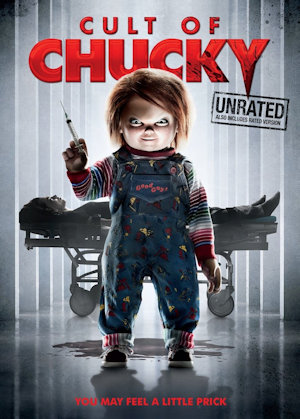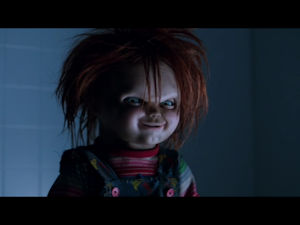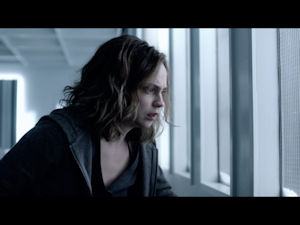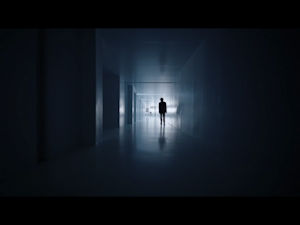Cult of Chucky - Movie Review
 | | This review is for the Unrated Version |
Don Mancini has achieved something quite remarkable: he has maintained full creative control over a profitable film franchise across seven films and nearly thirty years, and he has managed to keep changing it to suit his creative whims and desires. Though the Chucky movies aren't as big today as they were in the nineties, they still have a devoted following and continue to make money. The latest installment, Cult of Chucky (releasing tomorrow on DVD and Blu-Ray, though it is currently available digitally), will no doubt continue the trend, boosted by the relatively warm reception of the previous one, 2013's Curse of Chucky, and the long-awaited return of Alex Vincent as Andy Barclay, the young protagonist of the first three films. Mancini has taken his franchise in multiple directions, from creepy horror to campy comedy and several places inbetween. Cult of Chucky is no different, and with this installment, Mancini has layered a psychological horror film over the top of a typical slasher template, but he has also allowed some of the humor and campiness of earlier entries to creep back in.
Cult of Chucky picks up the story of Nica Pierce (Fiona Dourif, reprising her role from Curse) four years after she survived the killer doll's onslaught and was subsequently blamed for his murders. She's spent that time in a maximum security mental hospital, where her doctor, Dr. Foley (Michael Therriault), has successfully convinced her that Chucky is a construct of her troubled mind and that she really did kill her family. However, after being sent to a different institution with less security, Chucky resurfaces and starts the body count all over again, forcing Nica to question her own sanity as Andy Barclay races to her aid.
It's a promising premise, and there's a new trick up Chucky's sleeve that I won't spoil here. However, the plotting is a bit wonky and the tone gets very confused. The story hurries along in order to get to the bloodshed, and in its rush to go from kill to kill, a lot of critical details are glossed over through sloppy narrative conveniences and unaddressed complications.
 | | Chucky is still deliciously twisted |
For example, after the first death, there is no official investigation, no police showing up to ask questions, and no fallout. The staff at the mental institution decide to bury the victim right there on the grounds--as though that's a thing mental institutions actually do--and don't bother to really talk to the patients about any of it. Worse, the murder weapon obviously points to one of the other patients, and that patient is hiding an enormous wound on her arm and somehow manages to clean up a pool of blood in her room without any of the orderlies noticing. Neither the wound nor the blood are ever mentioned again, despite how implausible it is that nobody would notice them. A lot of the story plays out that way. Rather than letting the consequences of events logically dictate the plot, the plot ignores those potential consequences in order to get to the next kill. This gives the story a shallow, convoluted feel that undermines a lot of what it is trying to do.
And then there's the tone. This movie can't decide if it wants to be a serious and disturbing psychological horror about a sane woman in a psych ward who has been convinced she is a homicidal maniac and must now face reality, or if it wants to be a fun Chucky flick with an over-the-top Brad Dourif and Jennifer Tilly yucking it up around a bunch of one-dimensional murder fodder. Thus, you'll go from a harrowing scene where one of the mental patients deals with her guilt over having murdered her own infant child to a campy scene where Jennifer Tilly recites goofy lines from earlier movies. The set design is full of minimalist, white architecture that could have been capitalized on to make for a surreal headtrip--there is one sequence that does go in that direction--but when the movie never hones in on that, the bare walls and empty hallways come across as cheap rather than provocative.
Even the kills don't feel terribly imaginative. The gore is definitely ratcheted up to a new level (especially for the unrated version), but most of the kills are sudden and uninspired. There's one decapitation early on that's just plain dumb. However, most of the deaths are unusually unceremonious for Chucky, who stabs, slices, and drills without any proper build-up. A couple of kills even occur off-camera. Granted, the body count is high--possibly the highest in the whole series--but almost none of the deaths are memorable. There is one rather disturbing death late in the movie that deserves credit for taking its time and doing something we haven't seen before, but that solitary exception only serves to highlight the dullness of every other kill. For a slasher movie, that's pretty hard to forgive.
 | | Nica's not as interesting this time around |
This is especially unfortunate as some of the characters have the potential to be interesting. The mental hospital setting makes room for colorful characters, and there are a few that stand out, like Malcolm (Adam Hurtig), a charismatic guy who may or may not be faking his multiple personalities, Madeleine (Elizabeth Rosen), the aforementioned woman who killed her colicky baby, and Nurse Carlos (Zak Santiago), who tries not to get emotionally invested in the patients but just can't help it. Also intriguing is seeing the adult Andy Barclay and how his character has developed in the many years since his last encounter with Chucky, but he's not in the movie enough to be properly fleshed out.
Unfortunately, for every interesting character, there is an awkwardly written and badly acted one. The institution's apparently only psychiatrist, Dr. Foley (who also seems to work in two institutions at once), is very poorly handled. He could have been sympathetic and interesting--in a better story, he could have even been the protagonist--but instead, he's relegated to a secondary villain role who doesn't seem terribly interested in listening to his patients or practicing any real medicine.
The most unforgiveable mishandling, though, clearly belongs to Nica Pierce, the heroine. She's a revelation in the previous movie, but in Cult of Chucky, her character is dictated more by the plot than by her own personality traits. The conflict between what she's been lead to believe and what she knows to be true is thrown away surprisingly early, but she continues to drift through the movie without accomplishing much of anything until the final act.
 | | The sets look cheap |
Granted, Fiona Dourif does some fantastic acting right at the end, but for most of the film, her character is almost entirely pointless. There is so much potential to explore what she's been through and who she is, but the movie simply ignores that, brushes off her entire arc within the first twenty minutes, and seems to put her on the screen just because it thinks it's supposed to. Mancini overlooked a fundamental choice that needed to be made very early in the story's development: either make the story revolve around Nica's character, or make someone else the protagonist. Fiona Dourif is a good actress, and her character was both interesting and dynamic in Curse of Chucky, but Cult of Chucky doesn't know what to do with her.
From a filmmaking perspective, there are some things to praise. The score, for instance, is excellent, with Joseph LoDuca returning to build on his haunting melodies from Curse. The effects work is also exceptional. The puppeteering is the best in the series to date, and the practical gore is simply awesome. There's one or two visual effects shots that don't work, but considering the low budget and high number of effects throughout, they're hardly a problem.
On the whole, though, Cult of Chucky is a major disappointment. It tries to have the best of both worlds, but it is neither as creepy as its more serious predecessors or as funny as its goofier ones. The story and design of the movie come across as lazy and confused, and the kills, though they reach new heights of gore and effects work, are just boring. Don Mancini would deserve credit for continuing to toy with genre, if only he had actually chosen to stick to one. This could have been an interesting and entertaining psychological horror that uses the tropes of the genre to push Chucky in a new direction, but instead, Mancini plays it safe by sticking to a traditional slasher formula and trying to please fans of both the serious and the silly. Whether or not it's the worst of the series is up for debate, but the Chuck's nowhere near the top of his game.
FINAL SCORE:





It has its moments, but this isn't a cult worth joining unless you're already a devotee.
|
-e. magill 10/19/2017
|
|